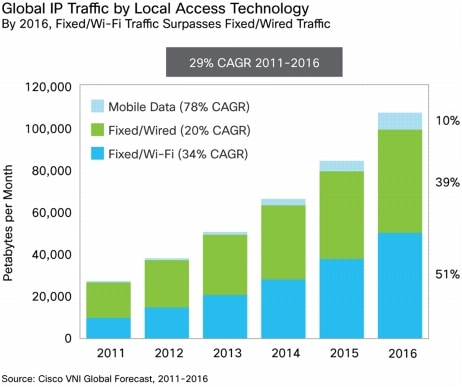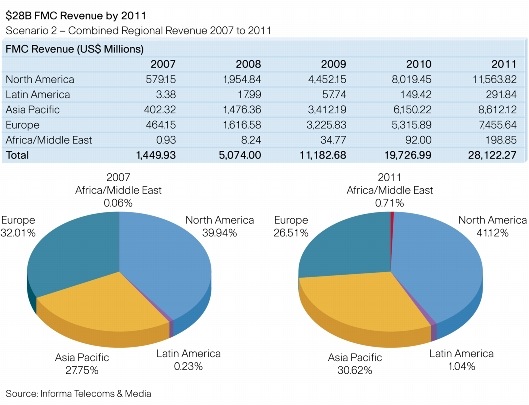 The funny thing about the Wi-Fi "market" is the somewhat unusual size of hardware supplier and end user revenue magnitudes.
The funny thing about the Wi-Fi "market" is the somewhat unusual size of hardware supplier and end user revenue magnitudes. In some ways, the Wi-Fi end user market is somewhat like the end user toaster market.
Money is spent buying toasters. Electricity is consumed using toasters.
But there is not much of a direct toaster usage revenue stream.
The Wi-Fi markets are similar, since the sales we can easily quantify are akin to "annual toaster sales," while usage is non-paid.
Of course, the value of Wi-Fi routers and network gear has a value far exceeding the value of network elements and routers sold. It just is hard to quantify, since nearly all Wi-Fi usage has no incremental cost of usage.
By IDC's reckoning, the equipment supplier market is more than $4 billion annually.
The market for Wi-Fi capable handsets is larger, at perhaps $30 billion to $40 billion annually. But neither of those sets of figures represents the value of Wi-Fi to application or Internet service providers. People don't buy Wi-Fi-capable handsets for the Wi-Fi, but for the full bundle of values a smart phone represents.
Consulting firm Infonetics projects that dual-mode Wi-Fi handsets (required for some approaches to FMC) represent a market of approximately 591 million handsets in 2008-2010, growing from 119.5 to 288 million handsets (forecast as of July 2007).

For service providers, most of the benefits of Wi-Fi offload are indirect, coming in the form of reduced customer churn, increased customer satisfaction, some revenue lift and significant avoided capital cost.
Some have tried to model a direct revenue effect.
According to Cisco, a mobile service provider can offload data and voice traffic to the Wi-Fi network, freeing up possibly scarce spectrum and thereby avoiding some amount of network investment.
If up to 50 percent of calls made on mobile devices are made on the business premises or at home, shifting those calls to Wi-Fi frees up spectrum for use by other customers and applications.
Assume, for example, that you have an average per-family revenue of US$80 per month, and three phones sharing a pool of 700 minutes.
You can make your own judgments about whether selling Wi-Fi access will be a big deal or not. In the U.S market, Wi-Fi access simply comes as a feature with smart phones, so there is not direct revenue beyond some apportioned share of the basic data plan a smart phone user must pay.
With a dual-mode fee of $30 per home location, permitting free calls over Wi-Fi and assuming a reduction in minutes per plan of $20 per month (because at-home calls are now free over the Wi-Fi/broadband haul), the net increase in revenue per family is $10 or $2.50 per person (family plan of $80 + FMC family fee of $30 adjusted for the smaller 500 minutes program, which subtracts $20), Cisco argues.
Assume that 66 percent of total cellular minutes move to the free Wi-Fi calling technology and that the mobile service provider has freed up 231 minutes per month (66 percent x 50 percent x 700 minutes).
Not only has the service provider gained $10 per family per month in revenue, it also has freed up enough spectrum to support approximately $42 worth of spectrum per month (assuming the new family also adopts the FMC solution).
This new capacity could translate into a $470 million opportunity over a million households.
For the consumer, the free "at home minutes" plus data access via Wi-Fi increase the value of the mobile dual-mode phone (which has Wi-Fi and cellular capability) even from service providers without 3G networks. And both consumers and businesses like putting a cap on total costs.
Informa U.K. researchers suggest a market for Wi-Fi offload services of between US$13 billion and US$37 billion by 2011, depending upon assumptions about the aggressiveness with which FMC services are promoted.
FMC's forecast number of subscribers reaches between 35 and 112 million consumers by that date. The enterprise forecast varies from 10-14 million subscribers by 2011. In other words, 20-27 percent of the revenue will be enterprise-based and enterprises will spend more on FMC per capita.
You can make your own judgments about whether selling Wi-Fi access will be a big deal or not. In the U.S market, Wi-Fi access simply comes as a feature with smart phones, so there is not direct revenue beyond some apportioned share of the basic data plan a smart phone user must pay.
Some us would be more comfortable with a non-direct revenue model lead by lower churn, higher customer satisfaction, capital investment savings and avoided demand on mobile network resources.
The point is that it is easier to quantify the value of Wi-Fi network gear, routers and some contribution to value when Wi-Fi capability is built into a smart phone, than to quantify the value Wi-Fi represents for a mobile service provider.
The point is that it is easier to quantify the value of Wi-Fi network gear, routers and some contribution to value when Wi-Fi capability is built into a smart phone, than to quantify the value Wi-Fi represents for a mobile service provider.







0 comments:
Post a Comment